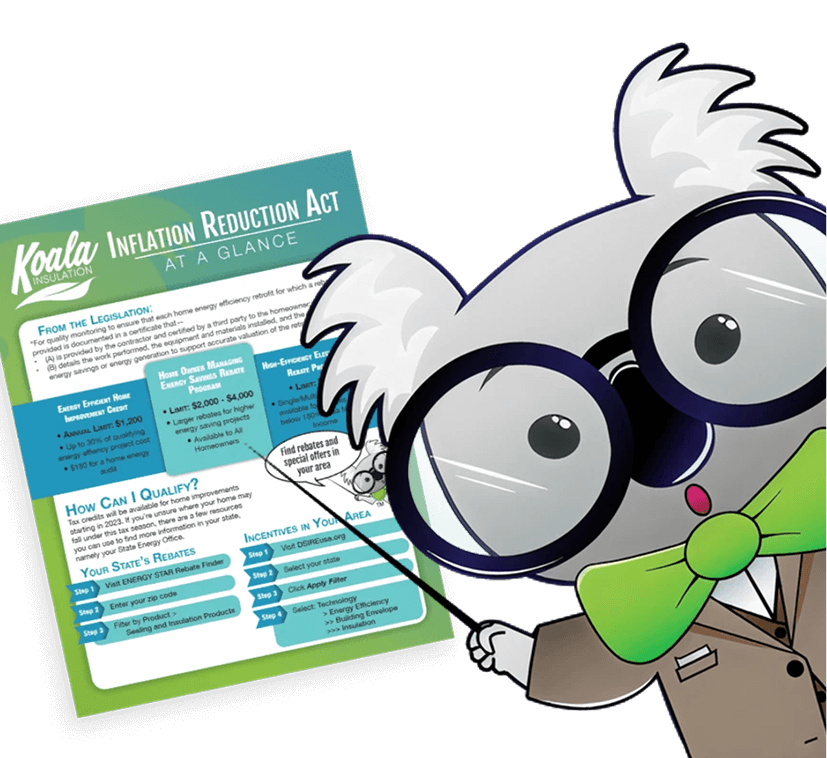Is Your HVAC Struggling? Have You Checked Your Insulation?

When your HVAC system seems to be working overtime, your first thought might be to blame the unit itself. But what if the real issue is lurking in your walls or attic? Poor or outdated insulation could be the silent culprit behind rising energy bills, inconsistent indoor temperatures, and excessive wear on your HVAC system.
If you live in Central Florida, where heat and humidity are constant challenges, ensuring your insulation is up to par is more important than ever. Here’s how insulation directly impacts HVAC performance—and what you can do to improve it with help from Koala Insulation of Orlando Central.
1. Your HVAC Works Harder Without Proper Insulation
Insulation acts as a thermal barrier, keeping indoor air in and outdoor air out. When insulation is insufficient, your HVAC system has to work much harder to maintain a comfortable temperature. This not only leads to increased energy consumption, but also puts added stress on the system, shortening its lifespan.
In the hot, humid climate of Orlando, poor insulation means your AC unit runs more frequently and for longer periods—leading to higher electricity bills and more frequent maintenance needs.
2. Uneven Temperatures? Insulation Might Be to Blame
Have you noticed some rooms in your home are significantly warmer or colder than others? This is a common sign of poor insulation or air leakage. When insulation isn’t installed evenly or is missing altogether in certain areas, it disrupts airflow and causes temperature fluctuations throughout your home.
Koala Insulation of Orlando Central can inspect your attic, crawl space, and walls to identify insulation gaps and help regulate temperatures across your entire home.
3. Higher Energy Bills Can Be a Red Flag
If your monthly utility bills have spiked without a corresponding increase in usage, don’t rush to replace your HVAC system just yet. Energy loss through under-insulated areas could be the root cause.
An energy audit or insulation inspection can reveal where you’re losing energy—and how sealing and insulating those areas can help reduce your costs year-round.
4. Old or Damaged Insulation Hurts HVAC Efficiency
Insulation can degrade over time, especially in Florida’s hot and humid environment. Moisture, pest infestations, or simple aging can break down insulation fibers, making them less effective.
Signs of deteriorated insulation include musty odors, visible mold, higher humidity levels indoors, and increased HVAC runtime. Upgrading to high-performance insulation materials, such as spray foam or blown-in cellulose, can restore your home’s thermal barrier and relieve your HVAC system.
5. Air Leaks Cancel Out HVAC Gains
Even the most efficient HVAC system can’t perform well if your home has unsealed gaps, cracks, or leaks around ducts, windows, and doors. These leaks allow conditioned air to escape, forcing your HVAC system to constantly cycle on and off.
Professional insulation services typically include air sealing measures to ensure a tighter building envelope. This not only improves energy efficiency but also enhances indoor comfort and air quality.
6. Insulation Supports Indoor Comfort in Every Season
In Central Florida, insulation needs to work hard in both summer and winter. It helps keep your home cool by blocking external heat and supports your HVAC in winter by keeping warmth inside. Without it, your home becomes more susceptible to outdoor temperature swings, which can impact your comfort and your system’s performance.
A well-insulated home requires less intervention from your HVAC system, keeping it running smoothly and efficiently all year round.
7. New Insulation = Less Wear and Tear on HVAC
The more your HVAC system runs, the more wear it endures. This means more frequent repairs, higher maintenance costs, and a reduced system lifespan. Installing quality insulation can reduce runtime by helping maintain stable indoor temperatures.
By lowering the workload on your HVAC system, you’re investing in its long-term performance and reliability.
8. Proper Insulation Improves Air Quality
Insulation isn’t just about temperature—it also plays a key role in maintaining good indoor air quality. Gaps and poorly sealed areas can allow outdoor pollutants, allergens, and humidity to enter your home, reducing air quality and triggering respiratory issues.
Koala Insulation of Orlando Central can recommend insulation solutions that improve indoor air control and reduce dust and allergens circulating through your HVAC system.
9. Schedule an Insulation Inspection Before Replacing HVAC
Before you invest thousands of dollars in a new HVAC system, make sure your home is properly insulated. Many homeowners are surprised to find that a simple insulation upgrade can solve many of their heating and cooling issues—without the need for a new system.
Koala Insulation professionals use advanced tools to assess insulation performance and identify areas for improvement that can boost your HVAC system’s efficiency.
Conclusion: Strengthen Your HVAC System with Insulation
If your HVAC system is struggling to keep up with the Florida heat, your first step shouldn’t be replacing it. Instead, look at your home’s insulation. In many cases, improving insulation can significantly boost HVAC performance, lower energy bills, and enhance overall comfort.
Koala Insulation of Orlando Central specializes in insulation solutions that are tailored for Central Florida homes. Whether you need an inspection, insulation replacement, or air sealing services, our experienced team is here to help. Call us at (407) 743-3487 or visit our website to schedule your free estimate today!
Find Your Location


Get a quote



